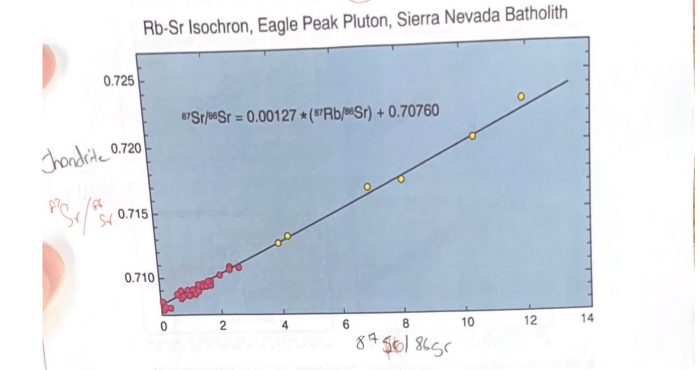All exams
1/108
There's no tags or description
Looks like no tags are added yet.
Name | Mastery | Learn | Test | Matching | Spaced |
|---|
No study sessions yet.
109 Terms
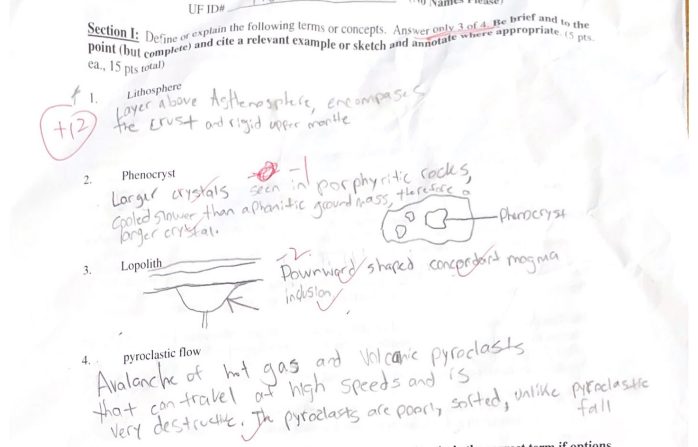
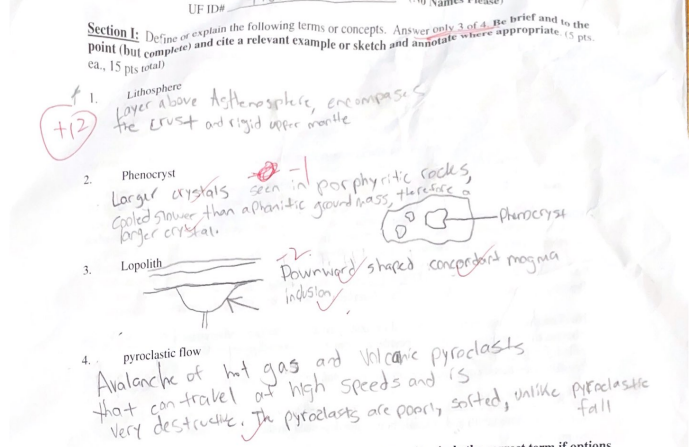
A typical geothermal gradient in the continental crust is ____ while the typical geothermal gradient in the oceanic crust is ____
25-30 / km
60/km
An intermediate composition sub-alkaline (andesitic) magma has at least ___ percent silica but no more than ___ percent silica
55
65
within the crust, on average, pressure increases at a rate of about 1 GPa (10 Kar) for every ____ km increase in depth
33
rocks can be classified and given specific names based on different types of characteristics/data. Name three types of data or characteristics that are commonly used to assign rock names
mafic/felsic, grain size, and/or mineral composition
When the earth differentiated the _____ elements (Goldschmidt classification ) were most concentrated in the crust and the _____ elements were most concentrated in the core. Possible selections: lithophile, halophile, atmophile, siderophile
lithophile
siderophile
The three defining minerals in the IUGS classification of felsic to intermediate non-feldspathoid bearing rocks are ____, _____, ______
potassium feldspar, plagioclase, and quartz
the three defining minerals in the IUGS classification of anhydrious ultramafic rocks are _____ , ____, and ________
Selections: Potassium feldspar, amphibole, plagioclase, biotite, orthopyroxene, clinopyroxene, quartz, muscovite, nephline, olivine
olivine, CPX, OPX
an ophitic texture is an intergrowth between the minerals _____ and _____
Selections: potassium feldspar, amphibole, plagioclase feldspar, biotite, orthopyroxene, clinopyroxene, quartz, muscovite, nepheline, olivine, albite
Plagioclase, CPX
A(n) ______ is a wormy-looking intergrowth of quartz in plagioclase and it is considered to be a ___ texture
myremekite
secondary
A _____ forms when magma interacts with deep ground water, a _____ forms when magma interacts with shallow ground water or surface water
Possible selections: maar, cinder cone, dome, stratovlcano, tuff ring, tuff cone
?????????
A _____ is a ______ stock with a flat floor and an arched roof.
Possible selections: catazonal, mesozonal, epizonal, concordant, discorndant
loccolith
discordant
The shallowest plutons, emplaced in a country rock of <300C are referred to as _____ whereas those emplaced at the deepest levels where country rock exceeds 450 C as called _____
Possible selection: catazonal, mesozonal, epizonal, concordant, discordant
epizonal
catazonal
A ____ eruption is a small pyroclastic eruption assocaited with mafic volcanoes where lapilli and volcanic bombs are deposited on the volcano flanks around the main eruptive vent
Choices: vulcanian, plinanian, strombolian
????
A ____ is the smallest volcanic landform associated with a central vent volcano
cinder cone
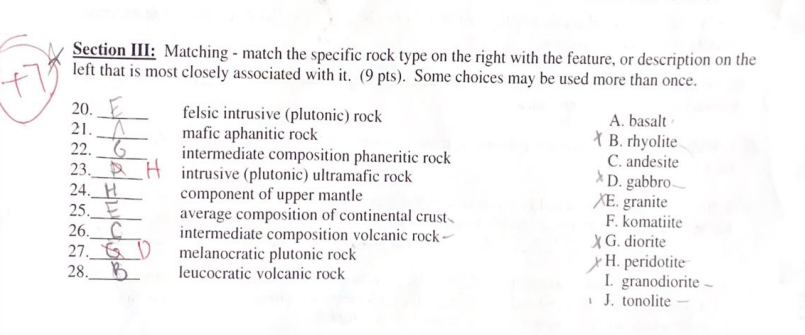
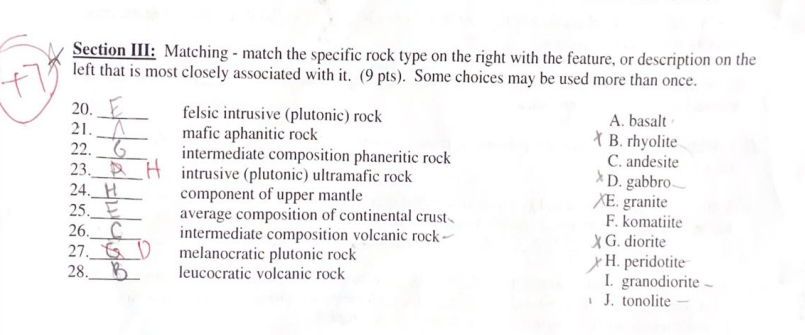
true or false: in a quartz tholeiite basalt, the mineral quartz is commonly an abundant primary phenocryst phase
false
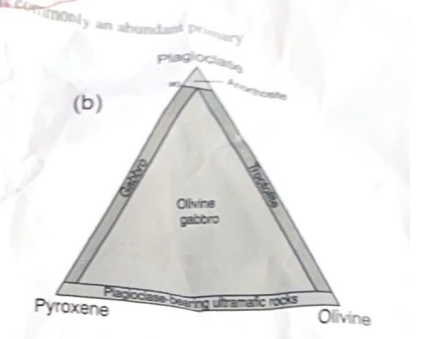
what is the classification (name) of an intrusive mafic rock comprised of primarily plagioclae and olivine (in roughly equal proportions) with only 3% pyroxene?
a. gabbro
b. plag-bearing ultramafic rock
c. troctolite
d. anorthite
e. olivnie- gabbro
c. troctolite
what statement below is true regarding the relationship between degree of undercooling, mineral nucleation and rock texture?
A. lesser/smaller degrees of magama undercooling lead to a greater number of nucleation sites and phaneritic texture
b. A. lesser/smaller degrees of magama undercooling lead to a greater number of nucleation sites and aphanitic texture
c. lesser/smaller degress of magma undercooling lead to fewer nucleation sites and phanertic texture
d. lesser/smaller degrees or magma undercooling lead to fewer nucleation sites and aphanitic texture
c. lesser/smaller degrees of magma undercooling lead to fewer nucleation sites and phanertic texture
a ____ style eruption is one of the largest and most destructive pyroclastic eruptions, whereas a ____ style eruption is one that is erupted in shallow seawater.
a. vulcanian, plinian
b. stombolian, surtseyan
c. plinian,hawaian
d. plinian, surtseyan
e. vulcanisn, hawaiian
d. plinian, surtseyan
which of the following is NOT considered pyroclastic debris?
a. ash
b. pahoehoe
b. bombs
d. cinders
b. pahoehoe
a ____ is defined as a plutonic body with <100km² surface exposure, whereas a ____ has greater than 100km2 surface exposure
a. laccolith, batholith
b. stock, batholith
c. lopoltih, stock
d. lacoolith, lopolith
b. stock, batholith
which of the following is dominated by rhyolite?
a. dome
b. lopolith
c. sill
d. stock
a. dome
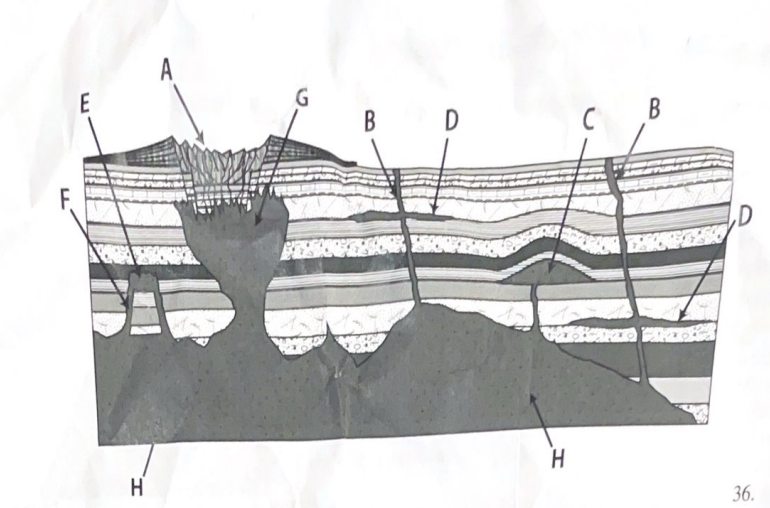
which letter points to a laccoltih
C
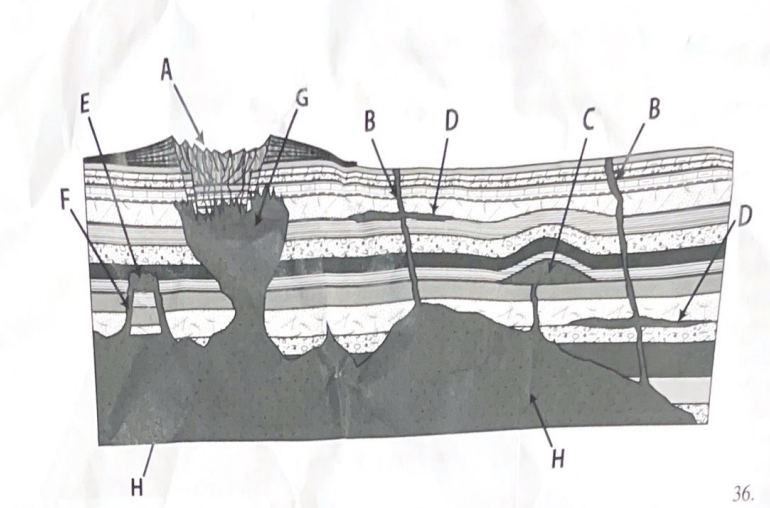
Which letter points to a sill?
D
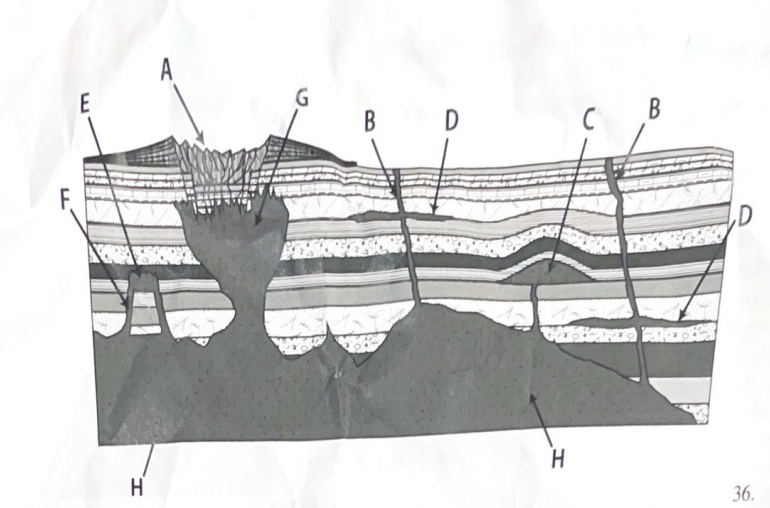
which letter points to a ring dike
F
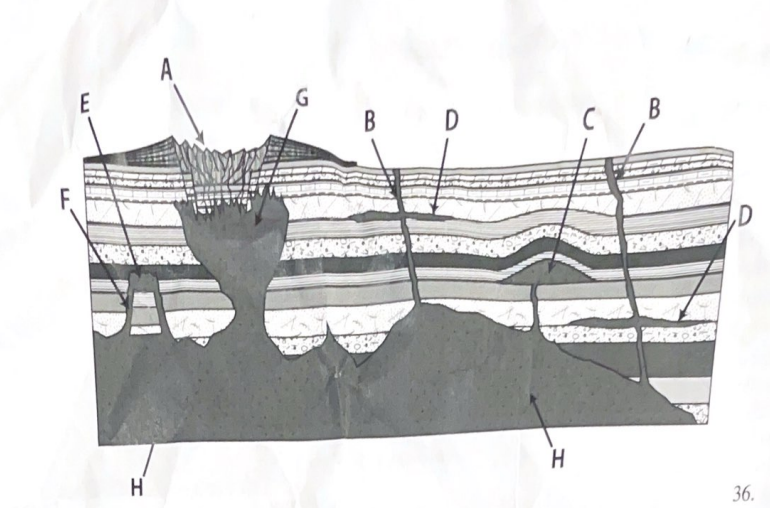
which letter points to a caldera
A
Idenitfy the most likely type from the description: Phaneritic salt and pepper colored rock made primarily of amphibole and plagioclase with minor amounts (<5%) of quartz
a. granite
b. gabbro
c. diorite
d. andesite
e. rhyolite
c. diorite
Identify the most likely rock type from the description: Aphanitic porphyritic rock with phenocrysts of olivine and plagioclase
A. diorite
b. granite
c. dacite
d. andesite
e. basalt
e. basalt
which mineral/mineral group would you be only likely to find in alkali rock?\
a. quartz
b. biotite
c. feldspathoid
d. orthoyroxene
c. feldspathoid
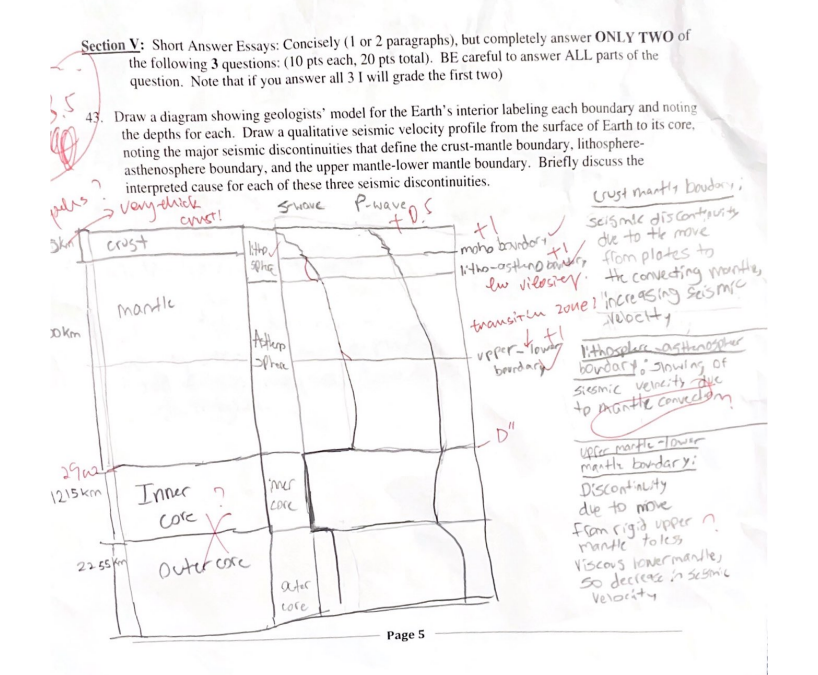
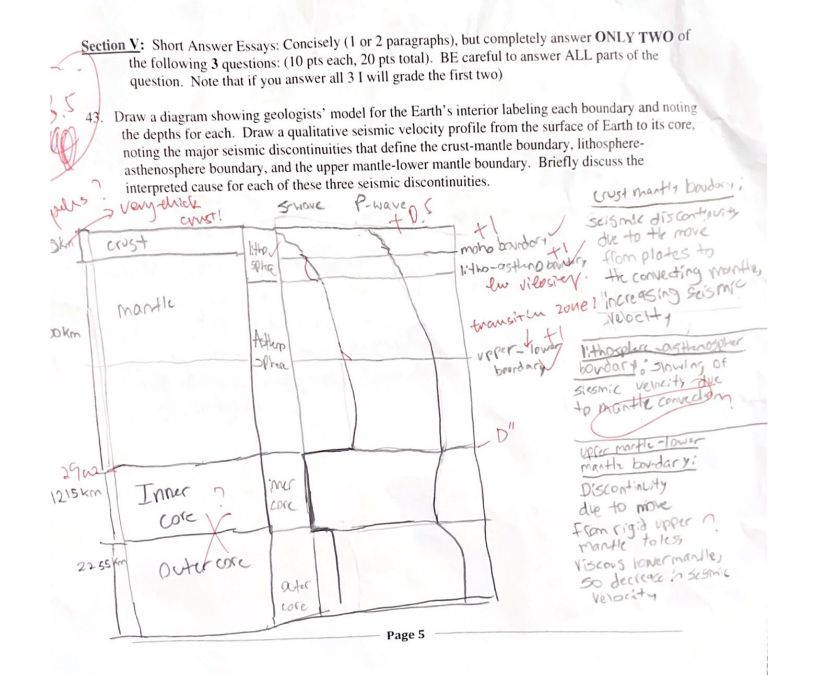
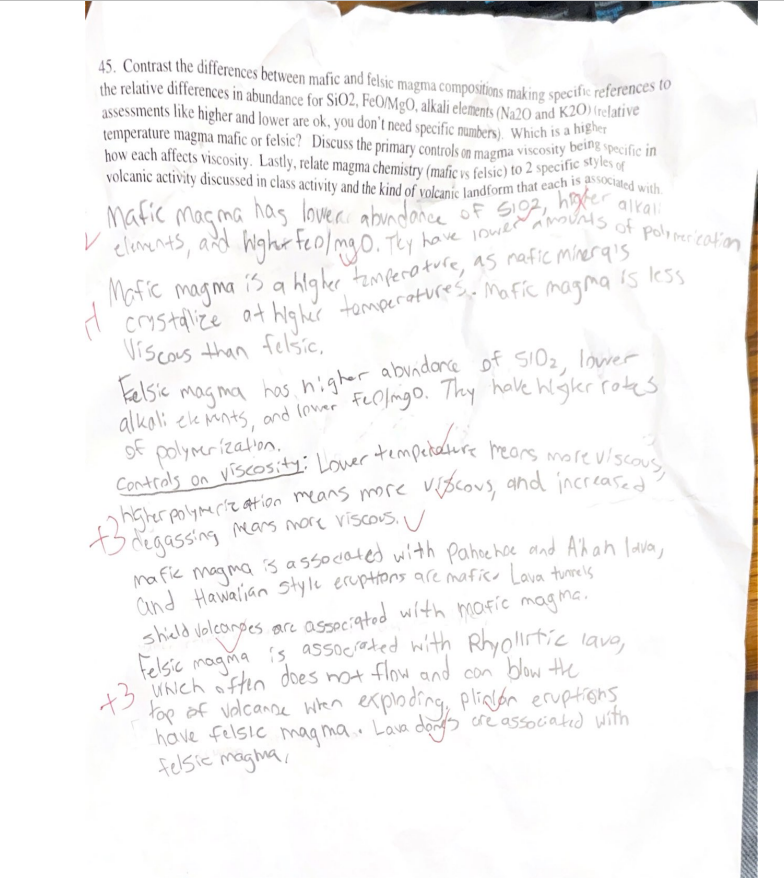
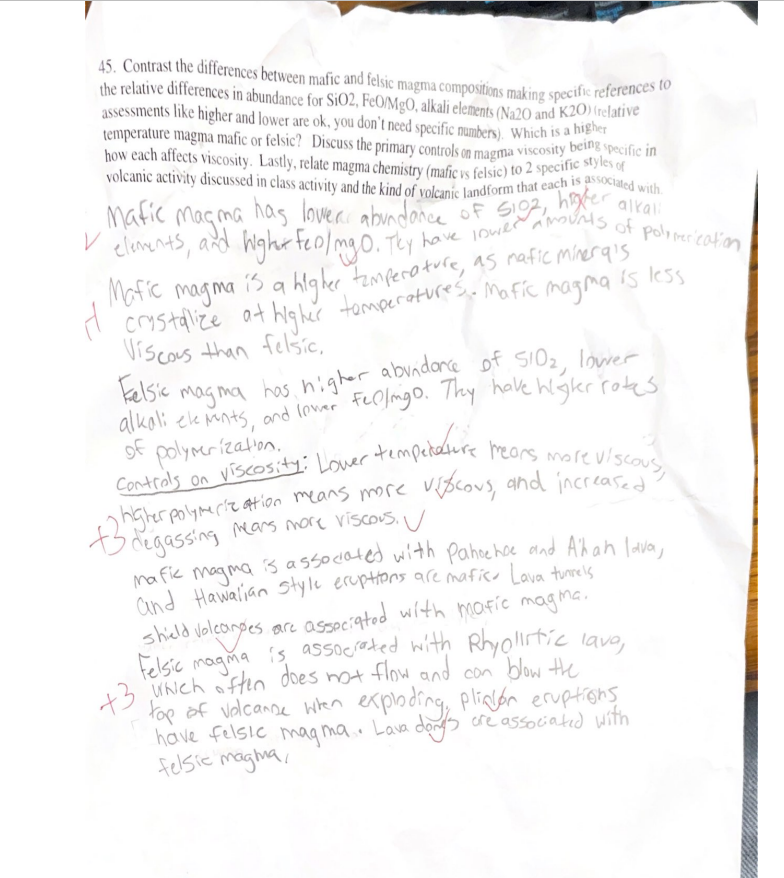
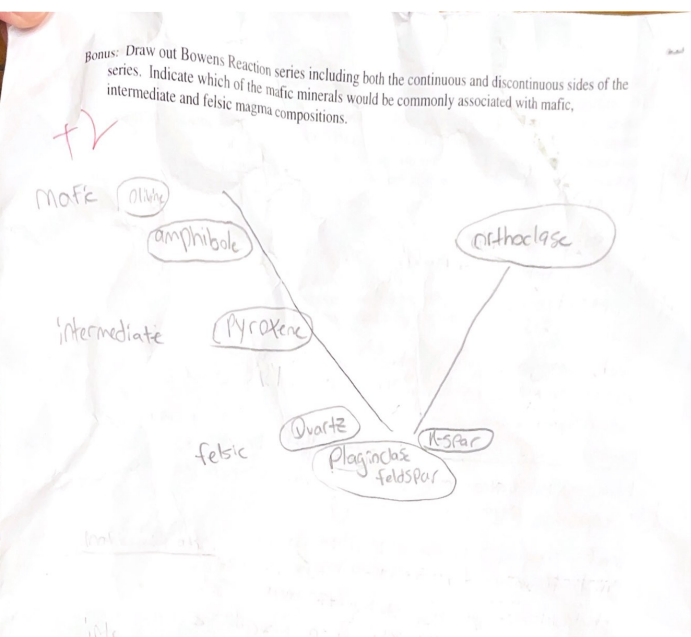
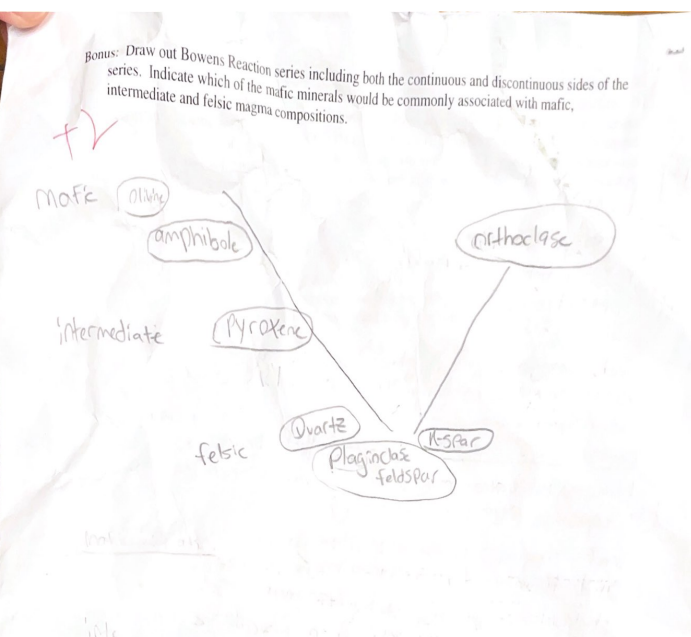
Generally, reactions happen with ____ G (gibbs free energy) and ____ S (entropy)
Maximum, maximum
maximum, minimum
minimum, minimum
minimum, maximum
minimum, maximum
typically adding another substance to a rock/magma ____ the liquidus temperatures
lowers
raises
does not affect
lowers
generally, melting reactions are favored by ___ temperature and/or ___ presssure
increasing, increasing
increasing, decreasing
decreasing, decreasing
decreasing, increasing
increasing, decreasing
which would be typically considered a minor element oxide in a mafic magma/rock
MgO
SIO2
AL2O3
NA2O
P2O5
SIO2
Tholeiitic lavas are associated with which magmatic environment
mid-ocean ridges
oceanic hotspots
subduction zone volcanic arcs
all of these
at mid-ocean ridges and oceanic hotspots, but no volcanic-arcs
all of these
calc-alkaline lavas are associated with which magmatic environment?
mid-ocean ridges
oceanic hotspots
subduction zone volcanic arcs
all of these
at mid ocean ridges and oceanic hotspots, but not volcanic arcs
subduction zone volcanic arcs
what is the difference between a major and trace element
major elements occur in abundance greater than 5 wt% and trace are less than 1 wt%
major elements occur in abundance greater than 1 wt % and trace are less than 0.1 wt %
major elements occur in abundance greater than 1 wt % and trace are less than 1 wt%
major elements occur in abundance greater than 5 wt % and trace elements are less than 5 wt %
major elements occur in abundance greater than 1 wt % and trace are less than 0.1 wt %
Periodic table group 1 and 2 elements that have large atomic radii and low charges are known as the ___ elements and an example of this kind of element is ___
LIL, Nb
LIL, Rb
HFS, Nb
HFS, Rb
LIL, Rb
Which of the following elements would be compatible in a basalt crystallizing olivine as a sole phase?
zirconium Zr
rubidium Rb
lanthinum La
Nickel Ni
Cesium Cs
true or false: on average, the high field strength elements tend to be more mobile (more easily perturbed) during the weathering and/or metamorphism of rocks than are the large ion lithophile elements
false
In a ____ melting process melt is removed from the solid as it forms, whereas in a ____ melting process melt accumulates and remains in equilibrium with the solid through some defined interval (%) of melting
disequilibrium, equilibrium
batch, fractional
fractional, batch
batch, equilibrium
fractional, batch
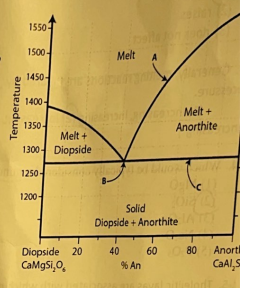
The diagram shown below is an example of a simple binary system without solid solution. Which arrow points to liquidus
A
B
C
A
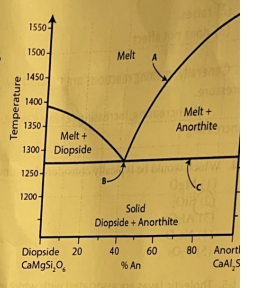
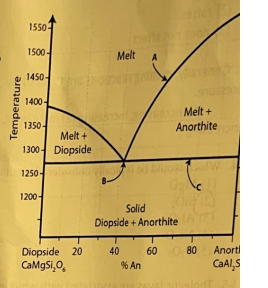
The diagram shown below is an example of a simple binary system without solid solution. Which arrow points to the eutectic?
A
B
C
B
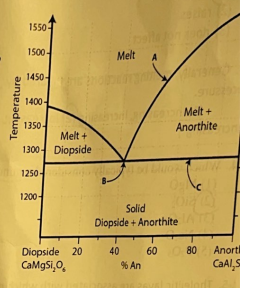
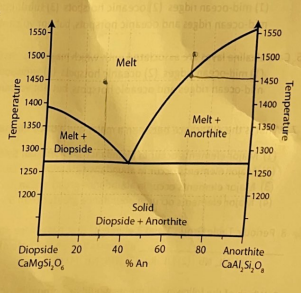
The diagram shown is an example of a simple binary system without solid-solution. In this system, for a composition of 70% Di: 30% An, what is the composition(S) of the first crystals to crystallize
A. 100% An
B. 100 Diopside
c. 70 Diopside 30 Anorthite
d. 30 Diopside, 70 Anorthite
B. 100 Diopside
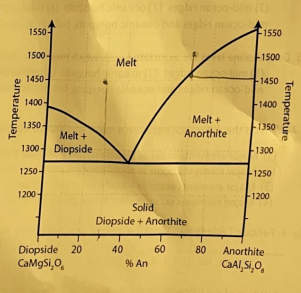
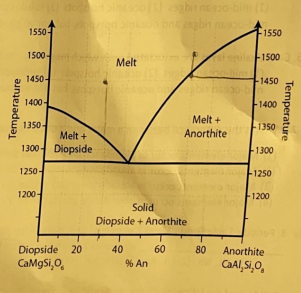
The diagram shown is an example of a simple binary system without solid-solution. In this system, for a composition of 35% Di: 65% An, what is the approximate composition of the first liquid produced upon partial melting
a. 100 Anorthite
b. 100 Diopside
c 35 Diopside, 65 Anorthite
d. 58 diopside, 42 anorthite
d. 58 diopside, 42 anorthite
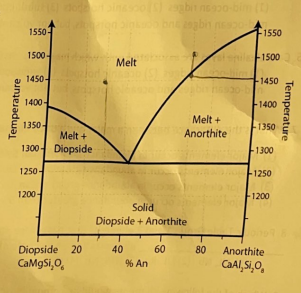
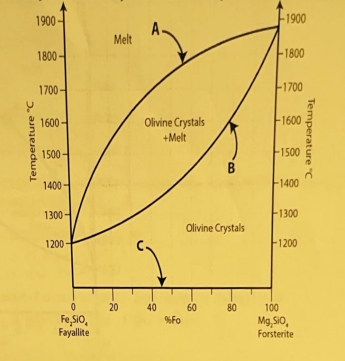
The diagram shown is an example of a binary solid-solution system. Which arrow points to the solidus.
A
B
C
B
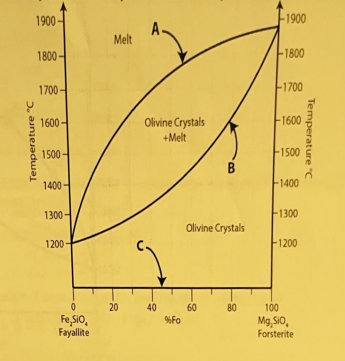
The diagram shown is an example of a binary solid-solution system. Using the Lever Rule for a composition X, which distance represents the % of crystals present at 1700C
A
B
C
A
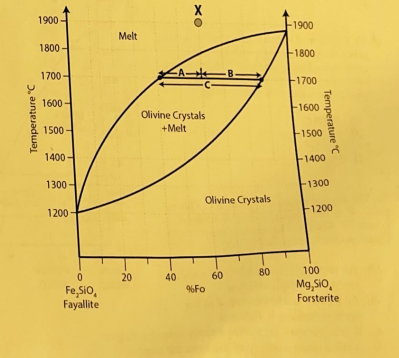
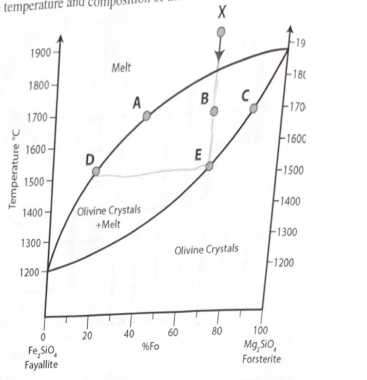
The diagram shown is an example of a binary solid-solution system. Starting with a melt of composition X, as temperature drops, which point represents the temperature and composition of the latest melt (liquid)
A
B
C
D
E
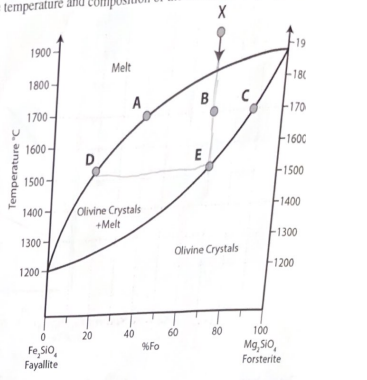
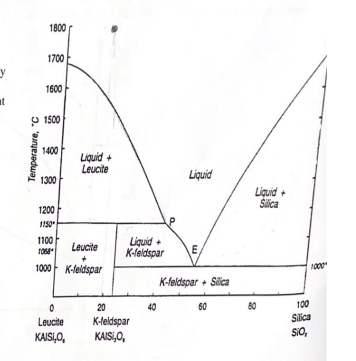
The diagram shown is an example of a binary peritectic system. Cooling with a melt of composition Leucite 80; Silica 20 at 1800C, what will be the final temperature of crystallization (temperature where first 100 solid)
a. 1500
b. 1420
c. 1150
d. 1000
c. 1150
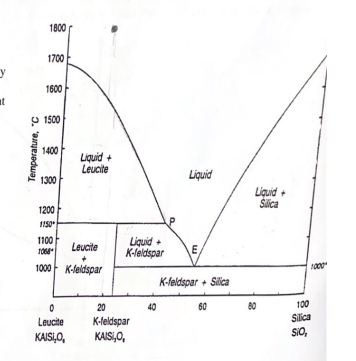
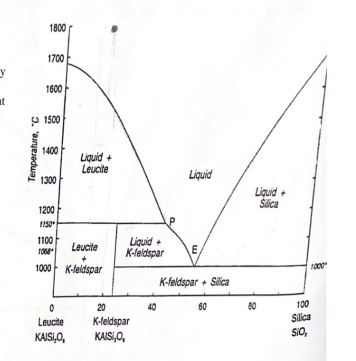
The diagram shown is an example of a binary peritectic system. For a system of composition Leucite 70; silica 30 what must happen before the liquid can cool below P (1150)
a. all previously formed leucite must be reacted to form K-feldspar
b. all liquid must be consumed in the reaction forming K-feldspar
c. K-feldspar must crystallize directly from the magma
d. a silica phase must crystallize from the magma
a. all previously formed leucite must be reacted to form K-feldspar
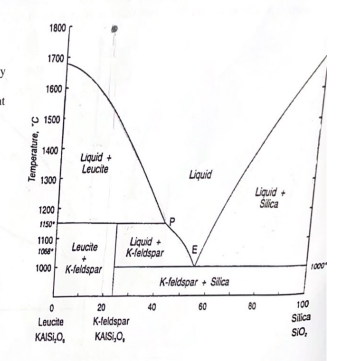
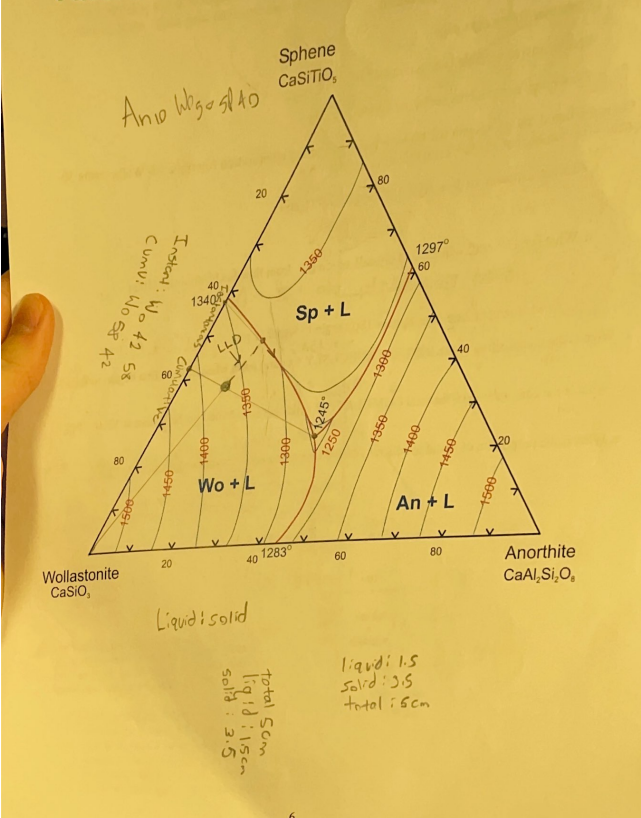
In this system (see figure)
What intensive variable is held constant?
How many components are in the system?
Pressure, 3

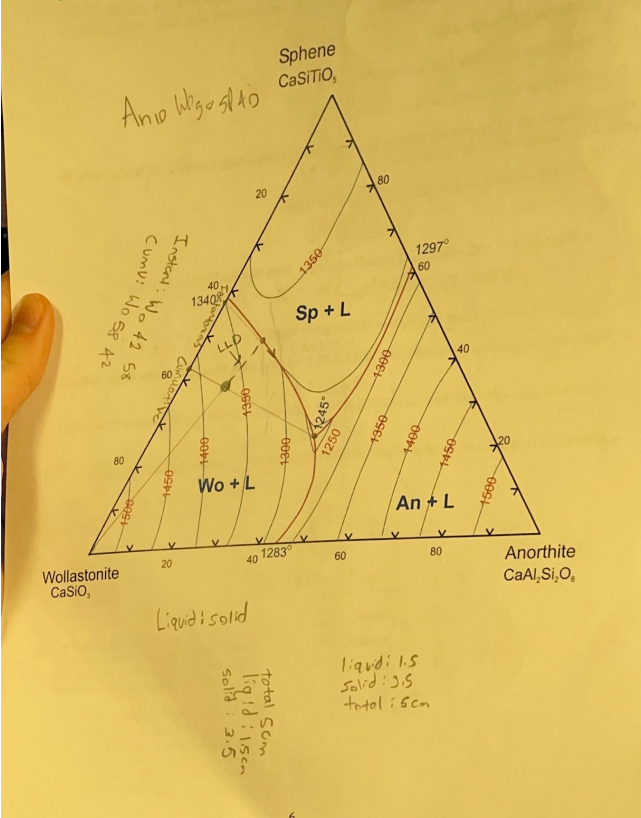
Draw the liquid line of descent LLD for a liquid of starting composition Anorthite 10- Wollastonite 50- Sphene 40 assuming equilibrium crystallization
i. at what temperature does crystallization begin?
ii what is the overall sequence of crystallization (i.e from liquidus to solidus)
iii. at what temperature does sphere (Sp) begin to form?
i. ??
ii Wo+L , Wo + Sp +L, Wo + Sp +An
iii. 1325 C ± 10 C
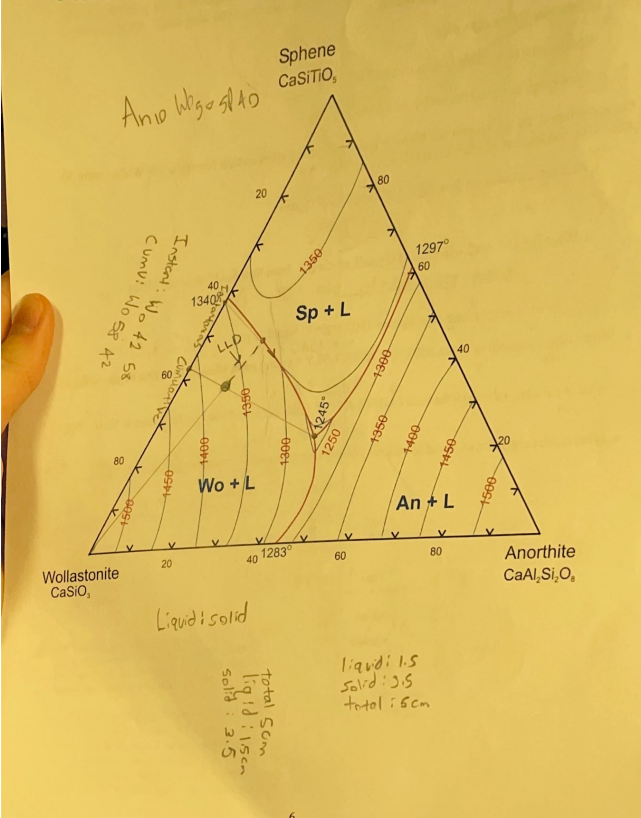
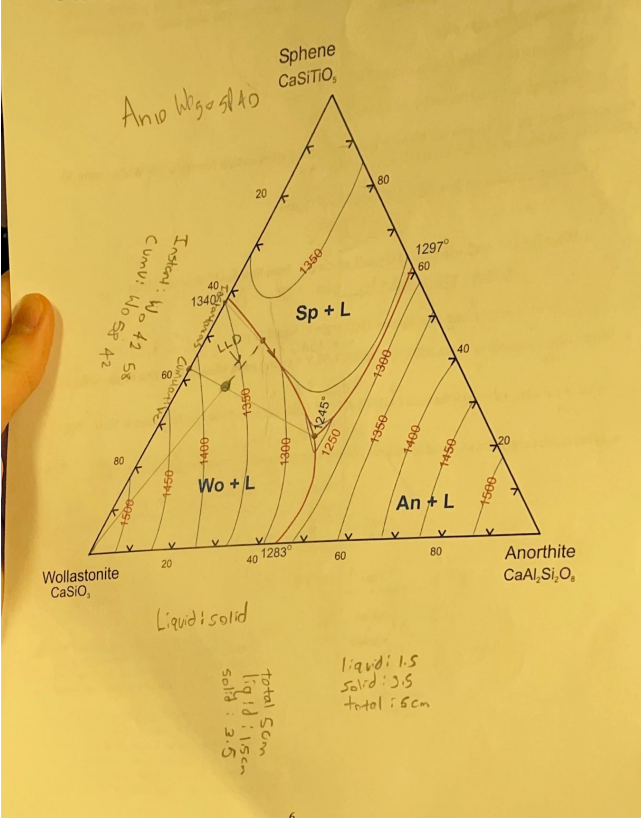
What is the composition of the INSTANTANEOUSLY forming solid when Sphene first begins to form?
Wo42 Sp58
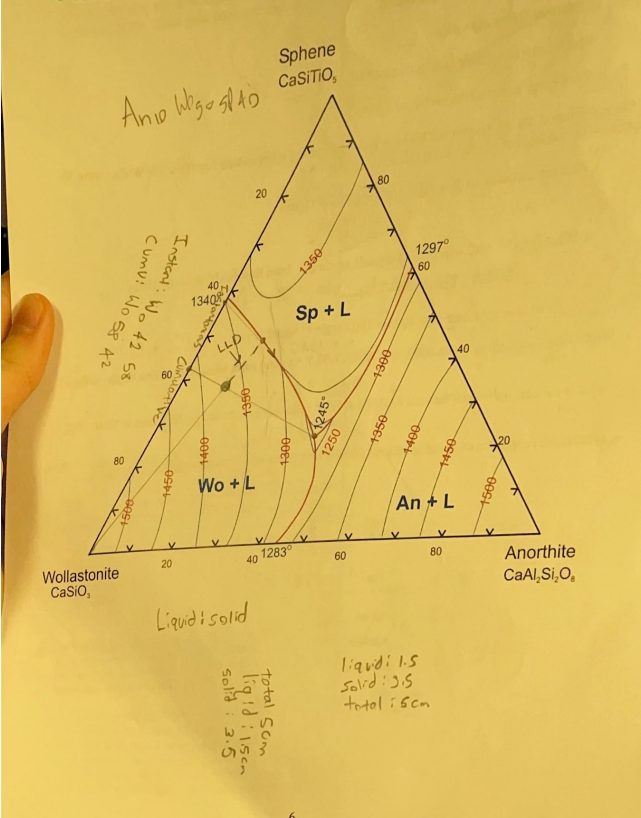
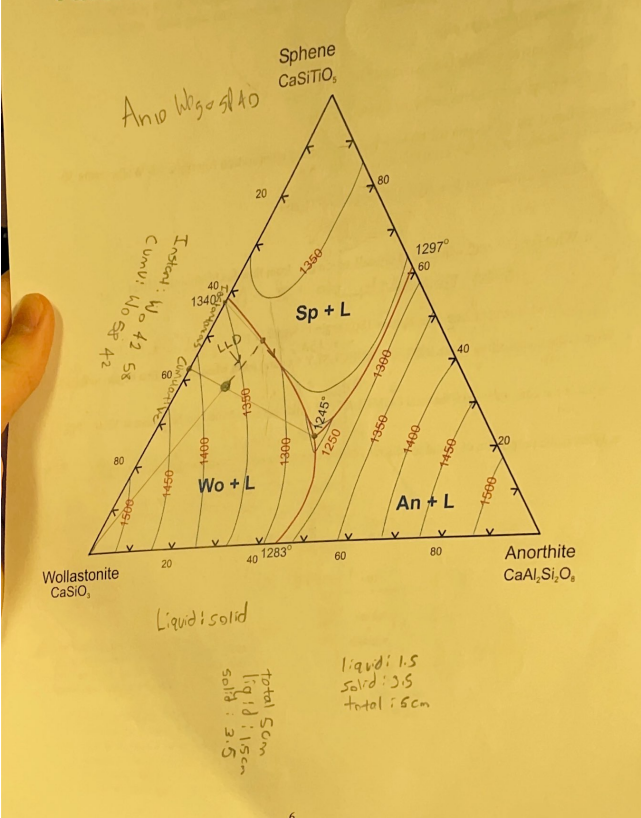
What is the composition of the total cumulative soild that has formed in the system at 1250?
???????
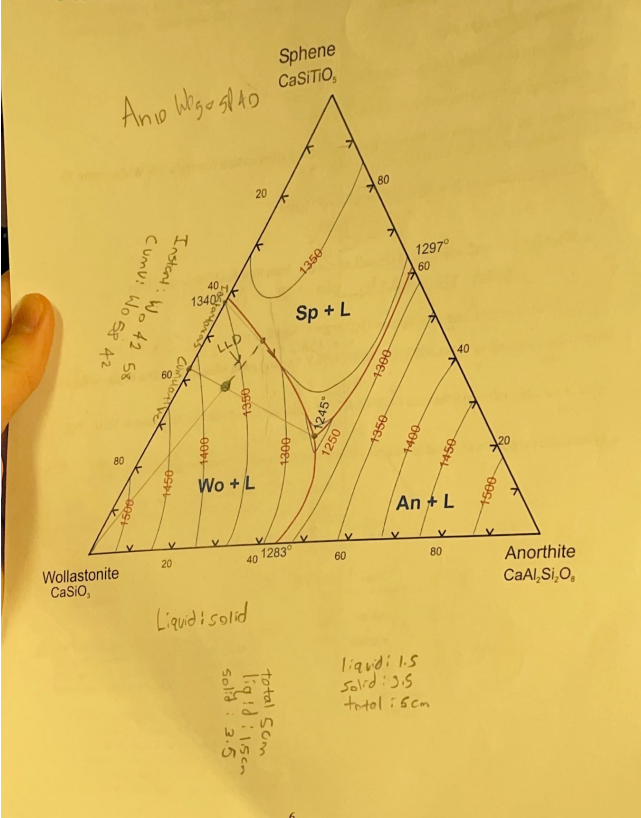
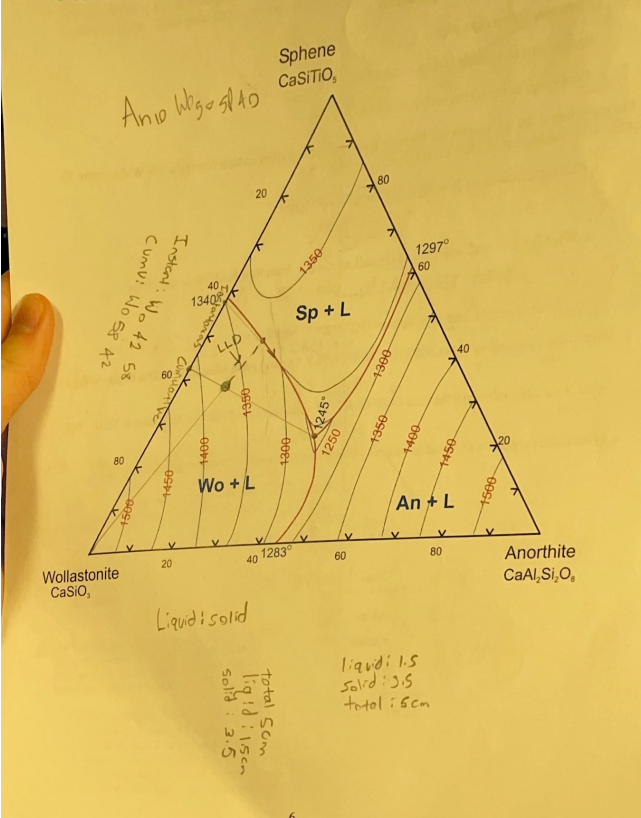
What is the proportion of liquid to solid at 1250
1.5: 3.5 cm
30% liquid: 70% solid
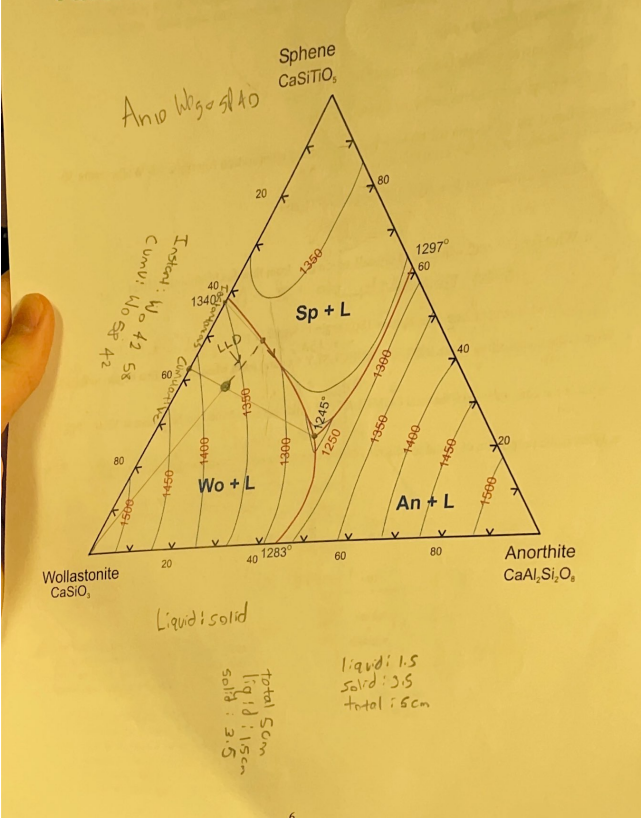
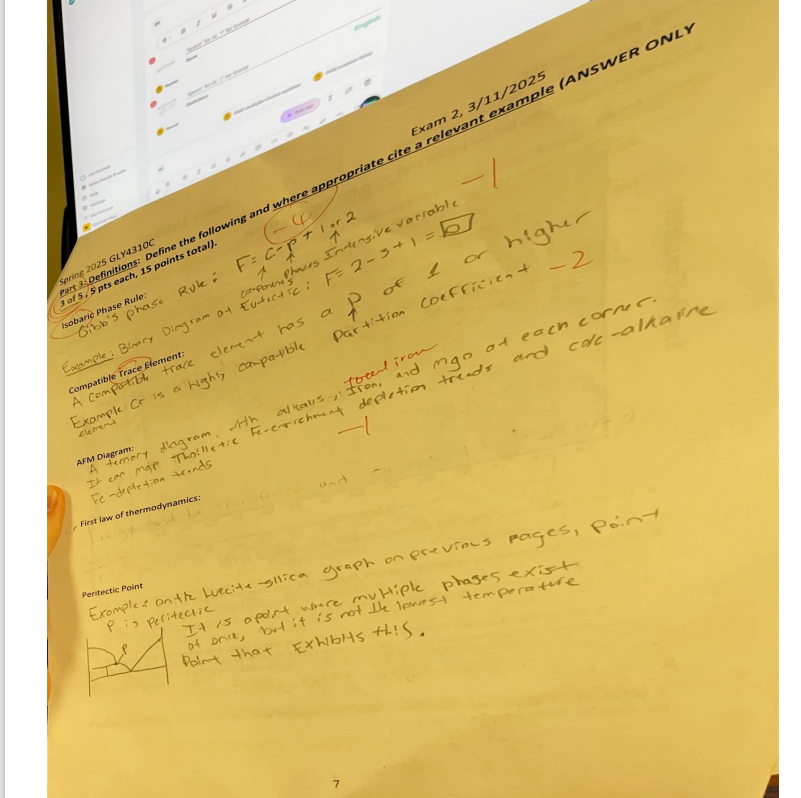
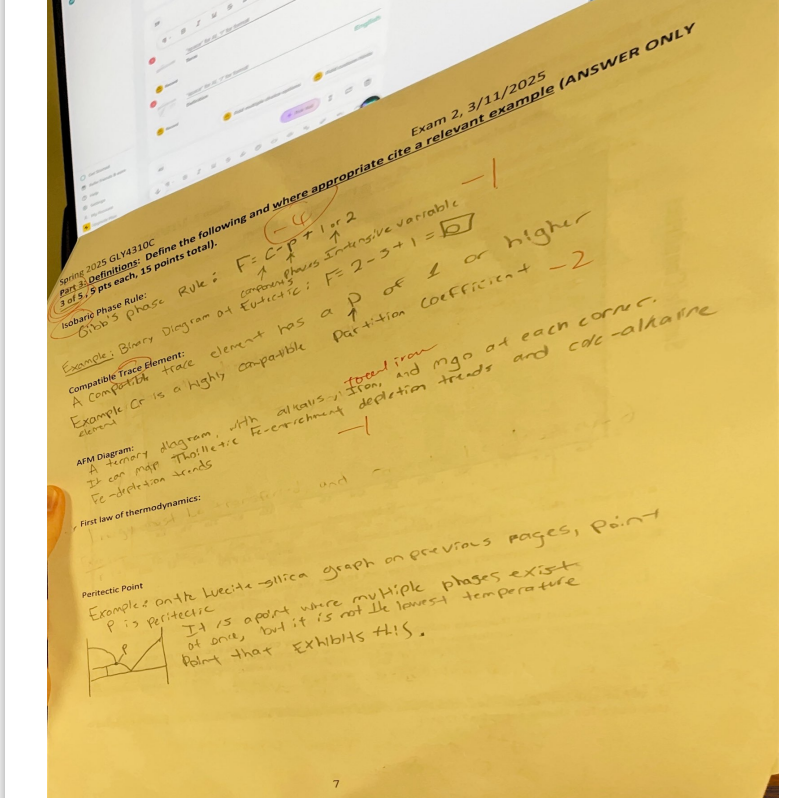
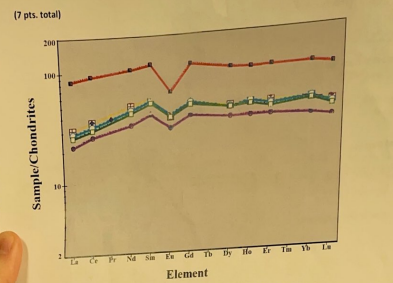
a. To what elemental group(s) do the elements belong to?
Lanthanides
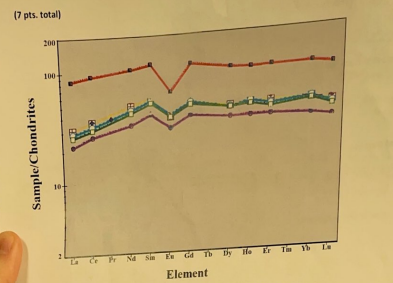
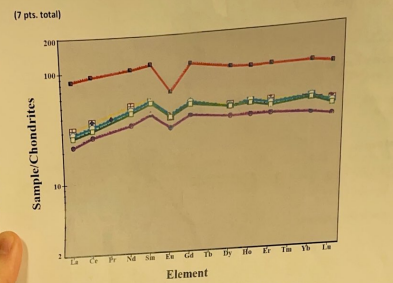
why are the elements ordered from left to right the way they are shown?
they are ordered by increasing compatibility determined by the author of the graph
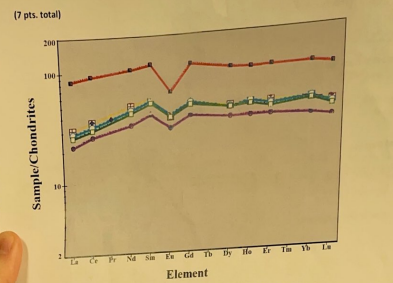
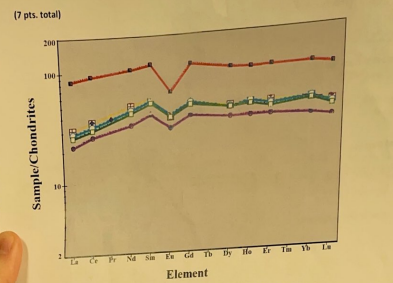
what about this diagram indicates the samples may come from a common parent magma? Which sample has undergone the most fractional crystallizaition
Similar trend path indicates common parent magma
Red line is more differrentitated
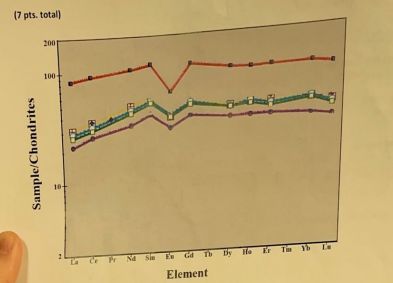
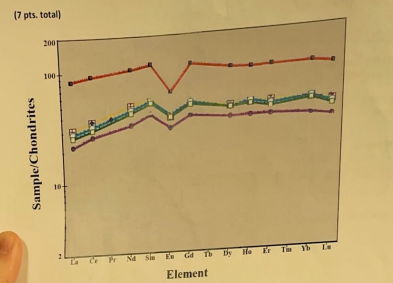
what specific process could have created the negative anomaly
Eu2+ anomaly from crystallization of plagioclase
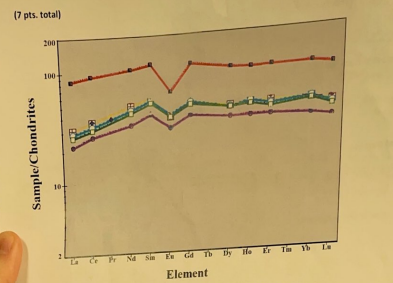
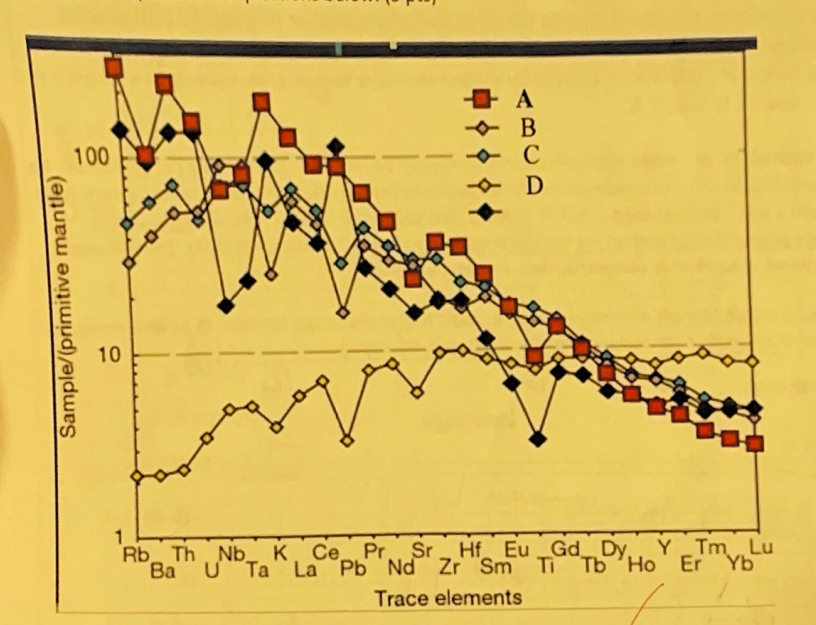
what type of plot is this?
Spider diagram
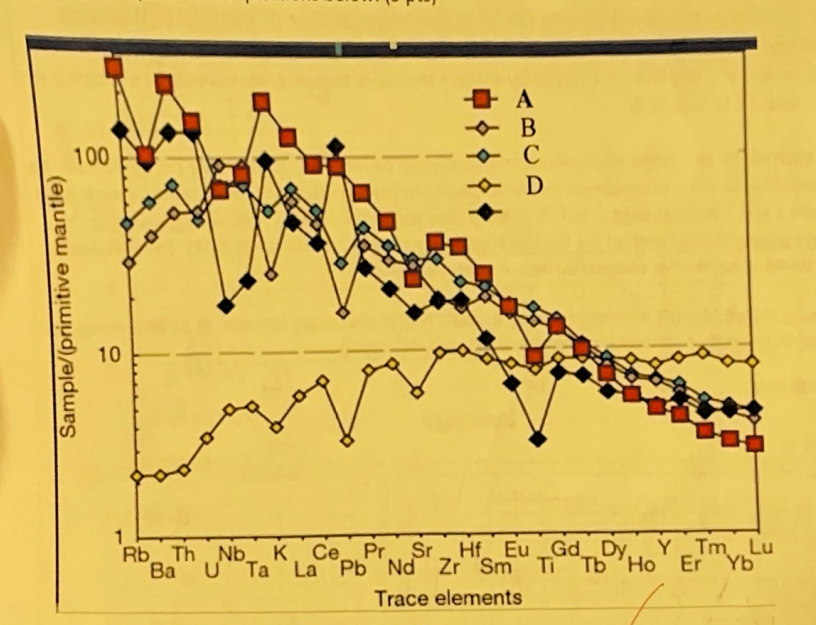
why are the elements ordered from left to right the way they’re shown??
???
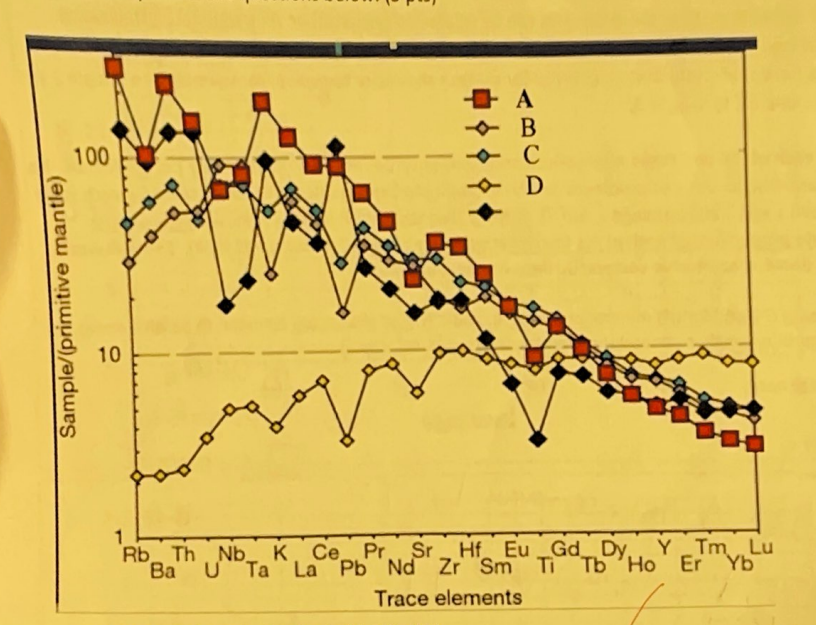
which sample (or samples) were from melt generated in the prescence of garnet
A-C, Garnet highly compatible with HSF elements
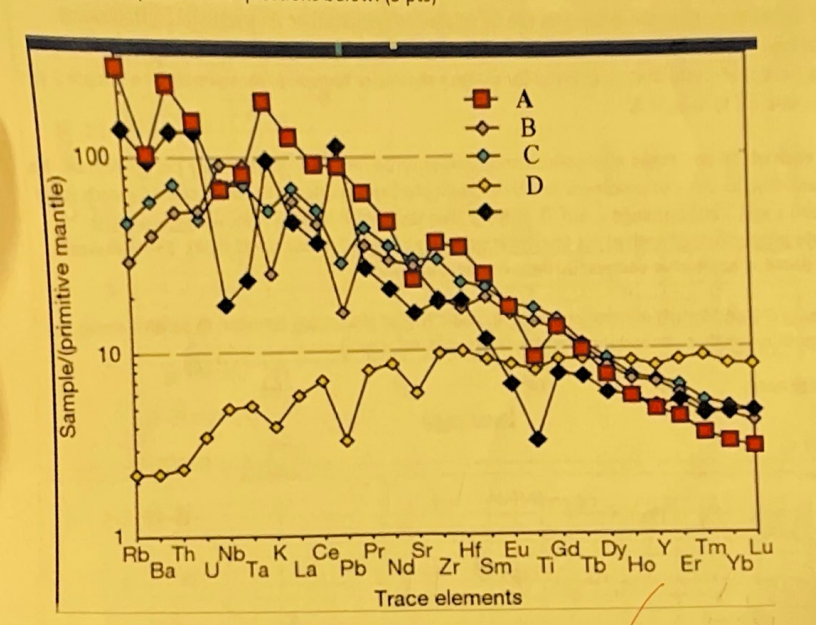
which sample or samples illustrates data from a typical mid-ocean ridge basaly MORN
D, (positive trend)
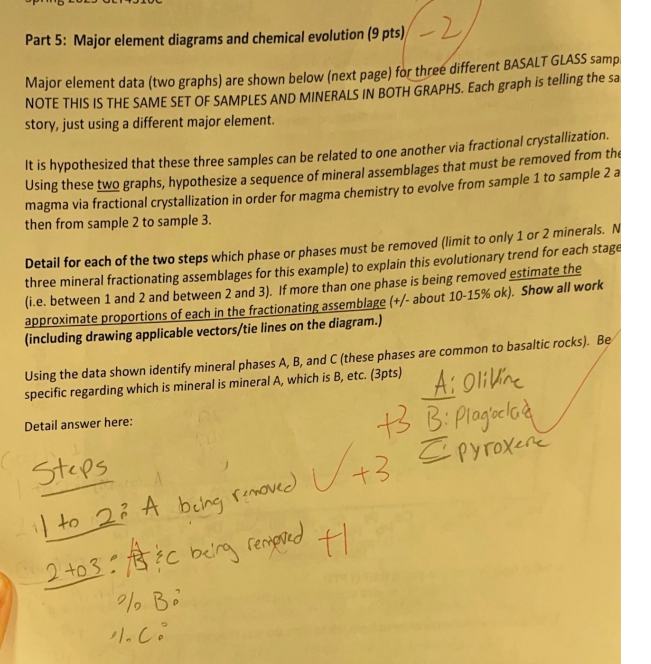
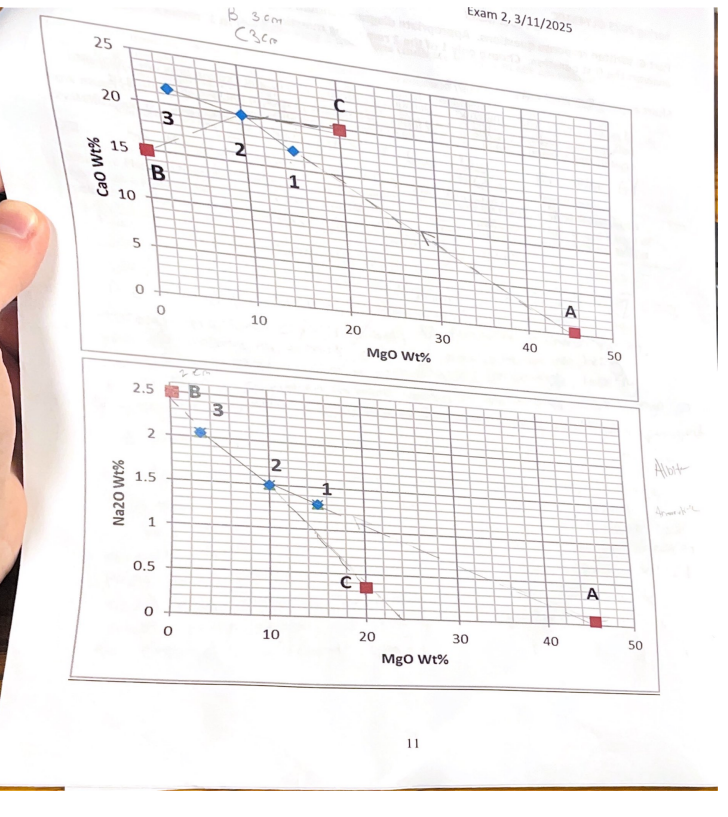

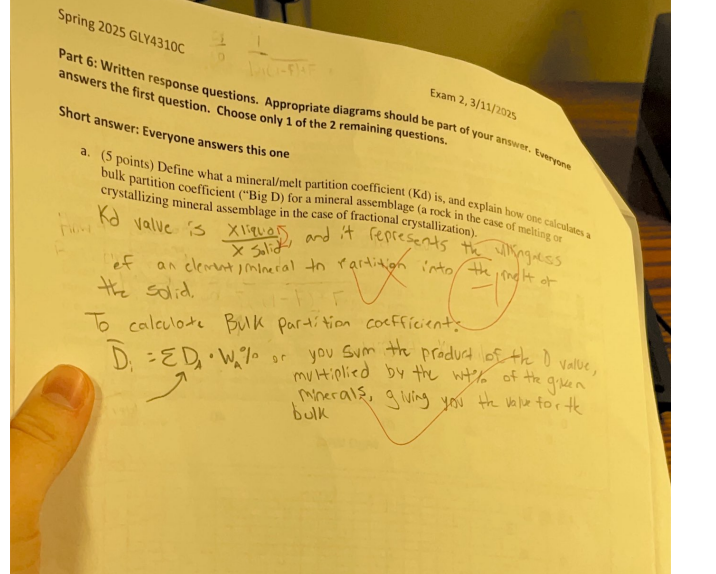
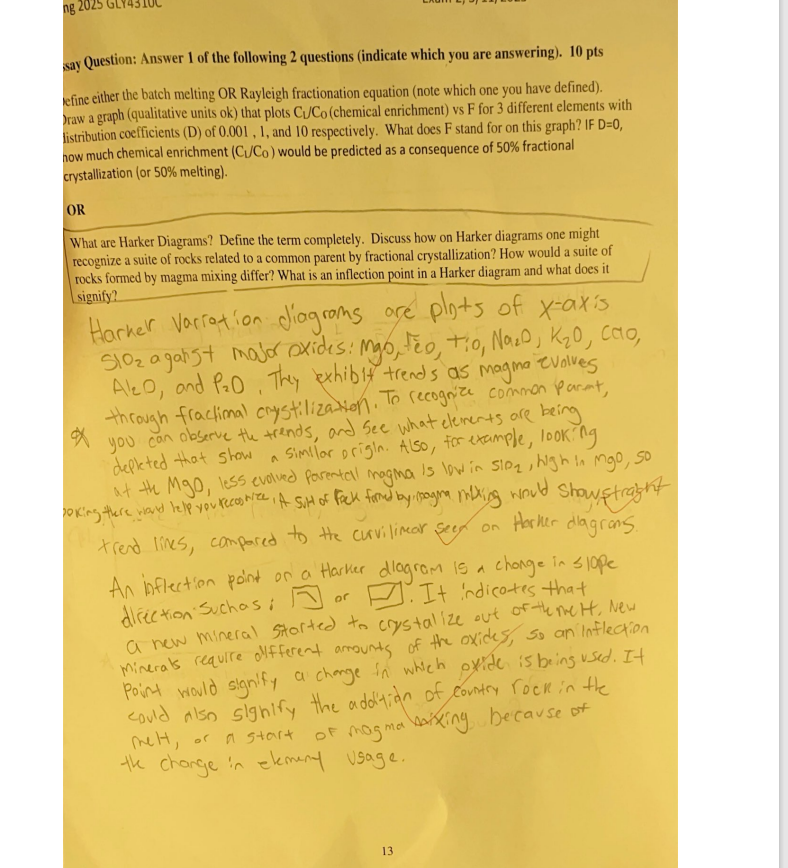
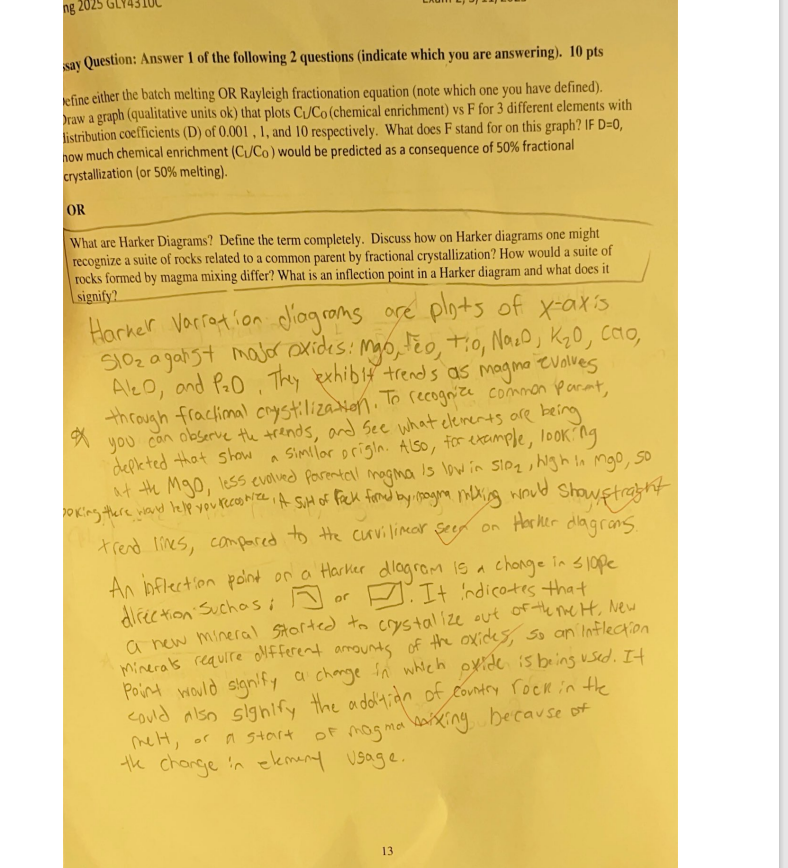
For which of the following isotopic systems do physical processes like evaporation, condensation, and crystallization cause mass fractional that can be used by geologists to inform on these processes.
1)Neodymium
2) Uranium
3)Oxygen
4)All of these
5)None of these
3) oxygen
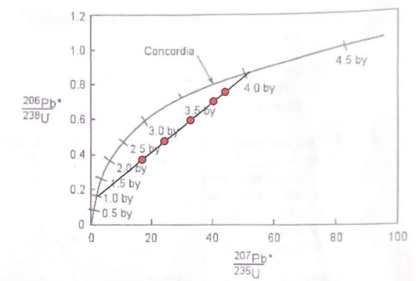
From the figure 1 below, what was the original age of the samples assume the data plotted are from zircons extracted from a granitic gneiss.
a. 3.0 by
b. 4.0 by
c 1.0 by
d. crystllization age cannot be constrained because zircons are discordant.
c. 1.0 bya (bottom intercept = age)
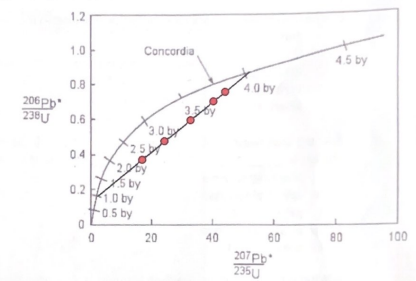
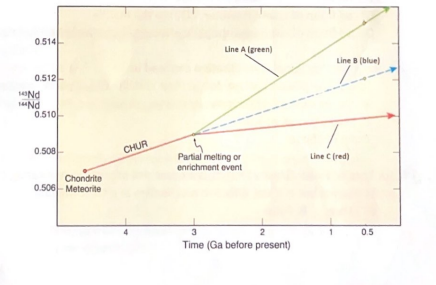
In the diagram shown at right, which trend represents the evolution of the depleted upper mantle?
a. Line A (green)
B. Line B (blue)
C. Line C (red)
A. Line A (green)
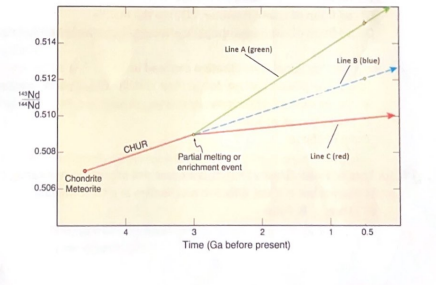
Lavas contaminated by ancient crust will show a ___ 87/86 Sr. Isotopic ratio and a _____ 143/144 Nd compared to lavas derived purely from a depleted mantle source.
a. lower, lower
b. higher, higher
c. higher, lower
d. lower, higher
higher, lower
True or false: A primary magma derived from partial melting of the mantle will have a high MG# above 65 and low abundances of both Ni and Cr
False
Which is the correct rock type for fertile, undepleted mantle?
A. dunite
B. Lherzolite
C. harzburgite
d. perfitite
e. wherlite
b. lherzolite
At the shallowest depths in the upper mantle, the Al- bearing accessory/minor mineral phase present is ___ whereas at depths greater than 80-100km it is ___
a. plagioclase, spinel
b. spinel, plagioclase
c. garnet, spinel
d. plagioclase, garnet
e spinel, garnet
d. plagioclase, garnet
what is the mechanism by which the mantle is induced to melt at mid-ocean ridges
a. increase in pressure on mantle rock
b.reduction in pressure on mantle rock
c.addition of volatiles (water, co2) to the mantle
d. addition of large-ion lithophile elements from the lower mantle
ab. reduction in pressure on mantle rock
polybaric fractional crystallization can lead to:
a. mineral phases change due to their stability change with pressure
b. the amount of liquidus phase change
c. exsolution of volatiles
d. all of the above
D. all of the above
True or false: gravity settling is a dominant process in separating crystals from liquid in a mafic magma but is a less effective mechanism in a felsic magma
True
volatile transport and enrichment can NOT be responsible for:
a. over-enrichment of the incompatible elements in the magma
b. pagmatites
c. porphyryr copper deposits
d. miarolitic pods
a. over-enrichment of the incompatible elements in the magma
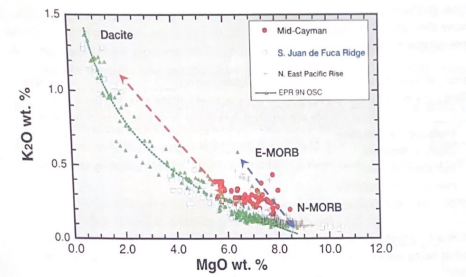
what is true of the data trends below marked by the dotted/dashed curves
a. the green dotted curve is a fractional crystallization trend whereas the red dashed line is a magma mixing trend
b. the green dotted curve is a magma mixing trend where the red dashed line is a fractional crystallization trend
c. the green dotted curve is a magma mixing trend whereas the blue and red dashed lines are the result of crustal assimilation
d. the curves only outline the data trends but have no petrologic significance
a. the green dotted curve is a fractional crystallization trend whereas the red dashed line is a magma mixing trend
compared to fast-spreading mid-ocean ridges, slow-spreading ridges:
a. erupt less frequently
b. consist of less evolved lavas
c. have wider faulted axial valleys
d. have more ephemeral and scattered magmas chambers
e. all of these
e. all of these
true or false: fast spreading mid ocean ridges tend to produce thicker crust than slow
true
which list places the morphological types of lava flows at mid-ocean ridges in order of increasing effusive rate (rate of magma eruption)
a. sheet, pillow, lobate
b. lobate, sheet, pillow
c. pillow, sheet, lobate
d. pillow, lobate, sheet
e. lobate, pillow, sheet
d. pillow, lobate, sheet
silica-undersaturated alkalic lavas are most commonly associated with which magmatic environment
a. mid-ocean ridges
b. oceanic hotspots
c. subduction zone volcanic arcs
d. all of these
b. oceanic hotspots
where do scientists believe enriched plumes are sourced form
a. subcontinental lithosphere
b. asthenosphere
c. above the subducted slab
d. core-mantle boundary
d. core-mantle boundary
in the hawaii model for hotspot volcanism, magmas with a ___ chemical affinity are most commonly erupted in the pre-shield phase whereas lava with a ___ chemcial affinity are erupted during the main shield-building phases
a. tholeiitic, calc-alkaline
b. alkaline, tholeiitic
c. tholeiitic, alkaline
d. calc-alkaline, tholeiitic
e. alkaline, calc-alkaline
b. alkaline, tholeiitic
which mantle geochemical reservoir has the highest Sr isotopic ratios and has been interpreted as being associated with ancient recycled continental crustal rocks or sediments
A. HIMU
B. DM
C. EMI
D. EMII
E. PREMA
D. EMII
Which option below is a proposed origin for the HIMU mantle geochemical reservoir
a. sediments derived from the upper continental crust
b. delaminated lithosphere mantle
c. ancient hydrothermally altered ocean crust
d pristine undepleted mantle
c. ancient hydrothermally altered ocean crust
in considering the ternary eutectic minimum fir the Olivine, CPS, OPX system (mantle rocks), what is the effect of increasing pressure on the composition of eutectic primary melts?
a. they become more hydrous
b. they become more iron-rich
c. they become more quartz normative
d. they become more silica undersaturated
d. they become more silica undersaturated
what is true about the mantle geochemical Reservoir called EM1?
A. it lies below the mantle array (lower Nd isotopes relative to its Sr isotopes) because it was less enriched in Rb compared to other enriched mantle sources (e.g EMII)
B. It lies below the mantle array (lower ND isotopes relative to it Sr isotopes) because it was more enirched in Sm compared to other enriched mantle sources (e.g EMII)
C. It lies above the mantle array (lower Nd isotopes relative to its Sr isotopes) because it was less enriched in Rb compared to other enriched mantle sources (EMII)
D. it lies above the mentle array (lower Nd isotopes relative to it Sr isotopes) because it was more enriched in Sm compared to other enriched mantle sources (e.g EMII)
A. it lies below the mantle array (lower Nd isotopes relative to its Sr isotopes) because it was less enriched in Rb compared to other enriched mantle sources (e.g EMII)
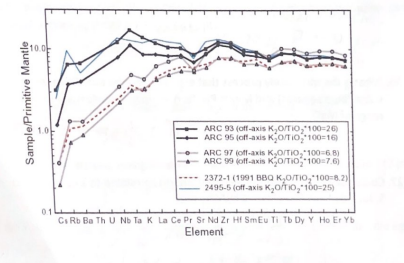
in the diagram below, what is TRUE of the lower sample grouping (ARC97, ARC99 and 2372-1) as compared to the upper grouping (ARC93, ARC95, and 2495-5)
A. the lower sample grouping (ARC97, ARC99 and 2372-1) was melted shallow, in the presence of garnet whereas the upper grouping (ARC93, ARC95, and 2495-5) was melted deeper
B. The lower sample grouping( ARC97, ARC99 and 2372-1) is most likely N-MORB whereas the upper grouping (ARC93, ARC95, and 2495-5) is E-MORB
C. The lower sample grouping( ARC97, ARC99 and 2372-1) is most likely N-MORB, whereas the upper grouping (ARC93, ARC95, and 2495-5) is most likely a hotspot related alkaline rock
d. The lower sample grouping( ARC97, ARC99 and 2372-1) is more geochemically enriched than the upper grouping (ARC93, ARC95, and 2495-5)
B. The lower sample grouping( ARC97, ARC99 and 2372-1) is most likely N-MORB whereas the upper grouping (ARC93, ARC95, and 2495-5) is E-MORB
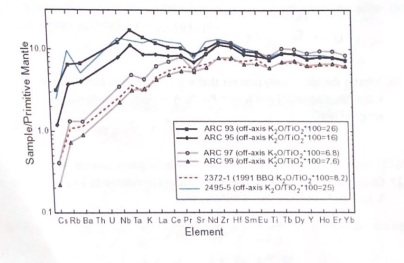
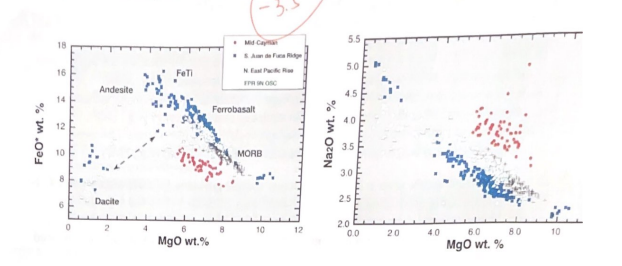
with what magma series (tholeiitic, calc-alkaline, alkaline) are these lavas associated? What about the data supports your answer?
tholeiitic, why???
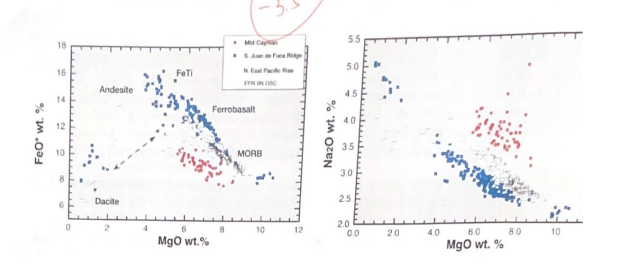
what is a strong change in direction of a data trend on a harker diagram called. What is the reason for the observed in the FeO vs MgO diagram
Inflection point, crystallization of new mineral that uses Fe causes an inflection point as it begins utilizing Fe in its crystals
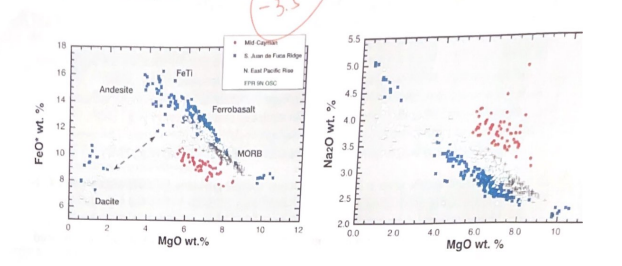
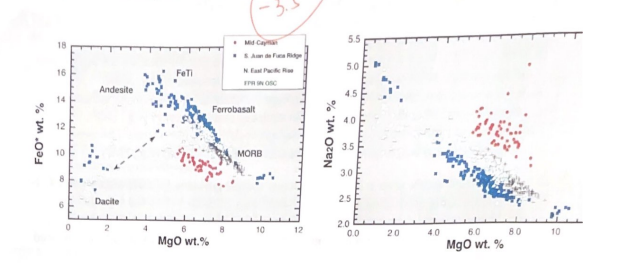
What is the most likely process that explains why the data from the S. Juan de Fuca Ridge (blue squares) and the N east pacific rise (open triangles) are spread over such a wide range of Mgo
fractional crystallization
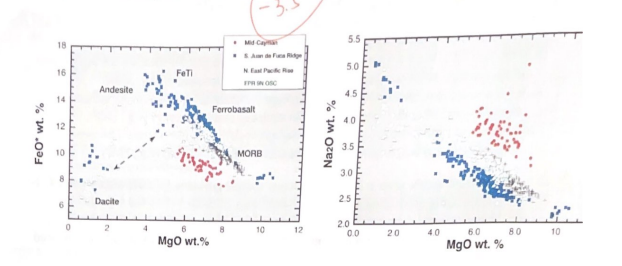
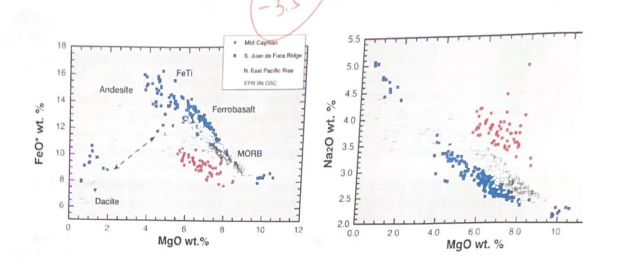
could the mid-cayman samples (red circles) be related to a common parent lavas as the S. Juan de Fuca samples. why/why not?
No they don’t follow any curvilinear or linear trends with S. Juan de Fuca, so they don’t have a common parent
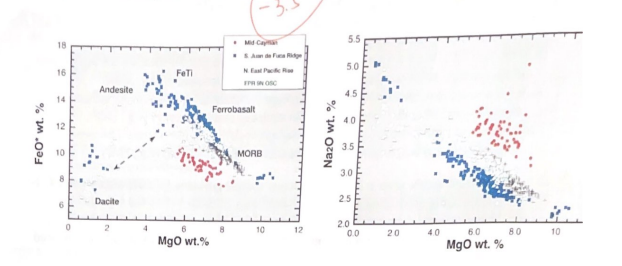
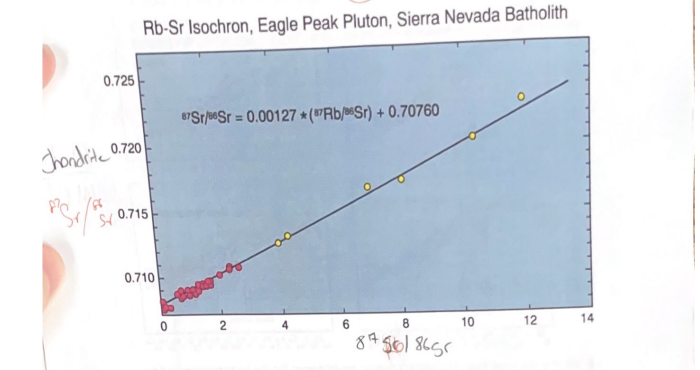
Label X and Y axes with correct label
X: 87Rb/86Sr
Y: 87Sr/86Sr
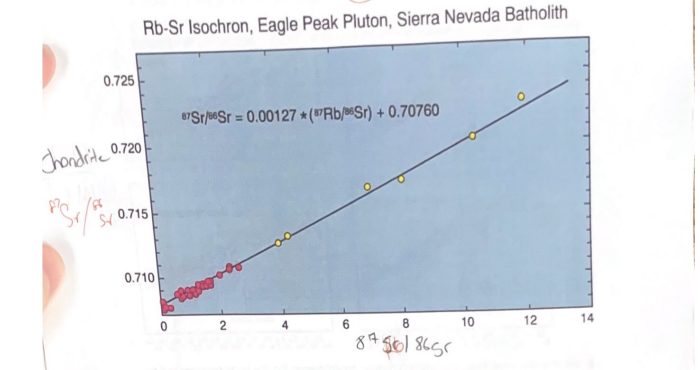
What basic (at a minimum) the criteria are necessary to use the isochron technique (what does one need to have in term of samples)
3 co genetic samples
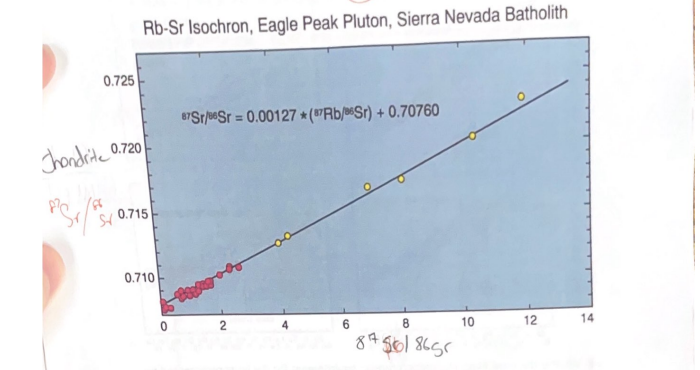
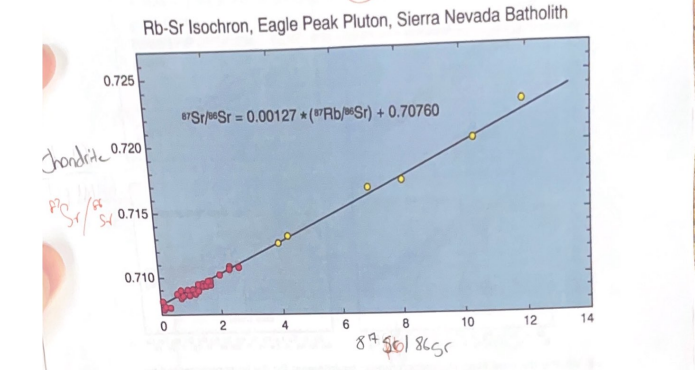
what aspect of this diagram is proportional to age of the sample?
Slope= age
